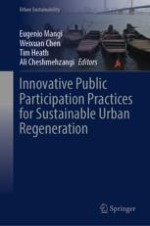2024 | OriginalPaper | Buchkapitel
8. An Ecology Model for Participatory Strategies: Community-Led Green Networks and Its Social and Spatial Agents
verfasst von : Diana M. Benjumea Mejia
Erschienen in: Innovative Public Participation Practices for Sustainable Urban Regeneration
Verlag: Springer Nature Singapore
Aktivieren Sie unsere intelligente Suche, um passende Fachinhalte oder Patente zu finden.
Wählen Sie Textabschnitte aus um mit Künstlicher Intelligenz passenden Patente zu finden. powered by
Markieren Sie Textabschnitte, um KI-gestützt weitere passende Inhalte zu finden. powered by
